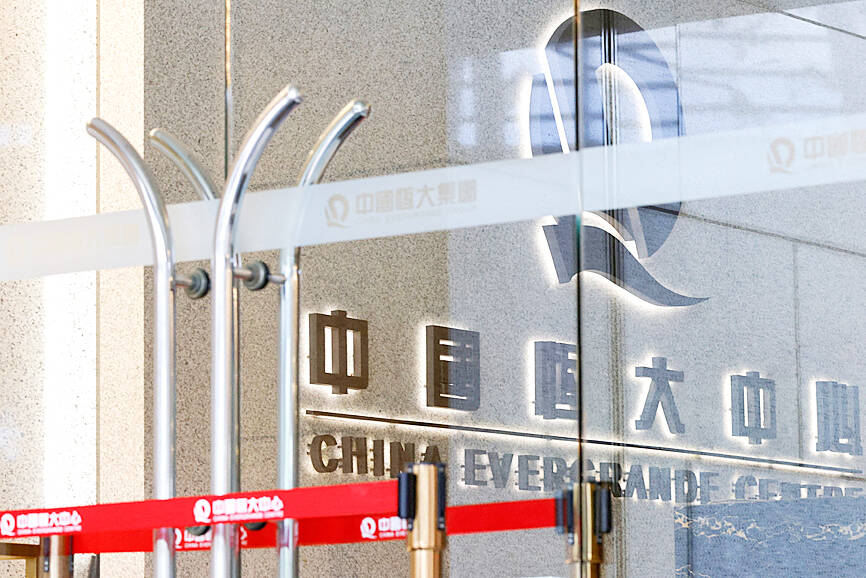Struggling property giant China Evergrande Group (恆大集團) has had a lucrative building plot in suburban Hong Kong sold off by its US receiver to cover a portion of the company’s massive debts, according to the company’s filings.
The undeveloped plot in the border district of Yuen Long was sold for nearly US$637 million, with Evergrande saying it expected to record a loss of approximately US$770 million on the land, according to a statement filed on the Hong Kong stock exchange on Sunday.
“The proceeds from such sale will be used to repay the company’s financial obligations in relation to the project,” Evergrande said.

Photo: Reuters
The Yuen Long land was first seized as security by the Los Angeles-based asset management fund Oaktree Capital Management LLC in January last year when Evergrande defaulted on US$600 million it had borrowed.
Evergrande spent more than US$1.13 billion to obtain the vast plot next to Hong Kong’s Mai Po Nature Reserve, an internationally significant wetland known as a “paradise for birds.”
The group originally proposed to develop 268 villas on the land, with a huge palace-like mansion at the center that it hoped to sell for US$510 million.
Hong Kong media last week reported that three mansions in the city’s prestigious Peak district owned by Evergrande founder Hui Ka Yan (許家印) had been seized by the China Construction Bank (中國建設銀行) and Japanese financier Orix Corp as repayment for loans.
The total market value of the three mansions was estimated to be US$318 million, according to online news outlet HK01.
The company is also looking to sell its headquarters in Hong Kong which occupies a highly sought-after patch of land on the harbor front.
Evergrande was due to unveil a restructuring plan in July, but the announcement was postponed to an unspecified date. Trading of Evergrande shares listed in Hong Kong has been suspended since late March.

South Korea’s equity benchmark yesterday crossed a new milestone just a month after surpassing the once-unthinkable 5,000 mark as surging global memory demand powers the country’s biggest chipmakers. The KOSPI advanced as much as 2.6 percent to a record 6,123, with Samsung Electronics Co and SK Hynix Inc each gaining more than 2 percent. With the benchmark now up 45 percent this year, South Korea’s stock market capitalization has also moved past France’s, following last month’s overtaking of Germany’s. Long overlooked by foreign funds, despite being undervalued, South Korean stocks have now emerged as clear winners in the global market. The so-called “artificial intelligence

NEW IDENTITY: Known for its software, India has expanded into hardware, with its semiconductor industry growing from US$38bn in 2023 to US$45bn to US$50bn India on Saturday inaugurated its first semiconductor assembly and test facility, a milestone in the government’s push to reduce dependence on foreign chipmakers and stake a claim in a sector dominated by China. Indian Prime Minister Narendra Modi opened US firm Micron Technology Inc’s semiconductor assembly, test and packaging unit in his home state of Gujarat, hailing the “dawn of a new era” for India’s technology ambitions. “When young Indians look back in the future, they will see this decade as the turning point in our tech future,” Modi told the event, which was broadcast on his YouTube channel. The plant would convert

‘SEISMIC SHIFT’: The researcher forecast there would be about 1.1 billion mobile shipments this year, down from 1.26 billion the prior year and erasing years of gains The global smartphone market is expected to contract 12.9 percent this year due to the unprecedented memorychip shortage, marking “a crisis like no other,” researcher International Data Corp (IDC) said. The new forecast, a dramatic revision down from earlier estimates, gives the latest accounting of the ongoing memory crunch that is affecting every corner of the electronics industry. The demand for advanced memory to power artificial intelligence (AI) tasks has drained global supply until well into next year and jeopardizes the business model of many smartphone makers. IDC forecast about 1.1 billion mobile shipments this year, down from 1.26 billion the prior

People stand in a Pokemon store in Tokyo on Thursday. One of the world highest-grossing franchises is celebrated its 30th anniversary yesterday.